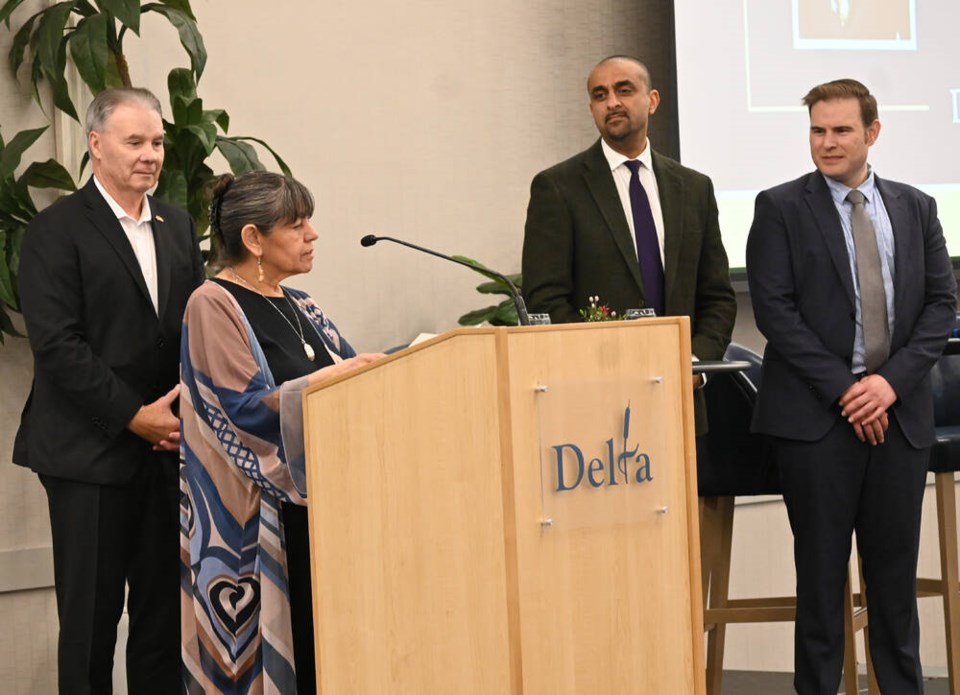Canada has been known as the land of plenty with lots of land, water, and forests.
But after a trip to Europe a few years ago, Delta North MLA and Housing Minister Ravi Kahlon realized Canada is now starting to deal with what Europe has had to do for a long time.
“We’ve been lucky here,” he told a room full of business leaders, bureaucrats and politicians at Delta Mayor George Harvie’s economic breakfast Friday (April 5) at Cascades Casino Delta.
“We do not have those same abundances anymore,” Kahlon said.
With the effects of climate change, Canada now has to innovate and make better use of its forests, water, and land.
Labour and talent is now mobile and can go anywhere in the world.
“And you can’t say to people all over the world, we want you to come here, and then say sorry, we have no housing,” he said.
Kahlon added that housing repeatedly came up as a major issue in Europe.
He added that the government’s housing initiatives are a reflection that, “What we’ve been doing for a long time is not working. It’s working for some people but it’s not working for a lot of people in our communities,” he said, adding that young people are not feeling hopeful given the challenge of housing.
“We have to do things differently,” Kahlon said.
He credited Delta though for welcoming the change in housing policies saying that some cities see change as a threat.
Heather McNell, deputy CAO for policy and planning at Metro Vancouver, said that according to the Regional Growth Strategy, another million people were forecast to come to Metro Vancouver by 2050. But that number could be reached before that.
It’s important to do accurate projections of future population so the proper resources are dedicated, to be able to handle the increase.
“By far, the biggest driver for growth in this region is immigration,” she said.
But intra-provincial population movement is also a large factor while lots of people land here then move to other parts of the province.
In the last few decades, the area had been receiving about 35,000 people per year. But after the pandemic with new federal government immigration targets, in the last few years, more than 60,000 people a year have arrived in the region.
McNell noted that one Metro Vancouver initiative involves speeding up rental housing by using pre-approved designs that developers can use when building a project. Metro Vancouver is also looking at using a standardized, pre-zoned approach.
Under recent provincial direction, Delta is one of the cities required to add to its housing stock by allowing the building of 3,607 units within five years.
Cities also have to update their official community growth plans to allow three or four units in single family home areas.
In most cities with more than 5,000 people, the changes will require bylaws to allow for three to four units permitted on lots currently zoned for single-family or duplex use, depending on lot size, as well as six units permitted on larger lots currently zoned for single-family or duplex use and close to transit stops with frequent service.
Delta planning staff have also speeded things up.
Delta’s general manager of community planning Doreann Mayhew, said the city was the first to no longer require public hearings for proposals that already comply with the official community plan.
As a result of provincial legislative changes, staff now have ability to issue development permits, liquor licences, etc, on behalf of council, which also speeds up requests. As well, because of streamlining, building permits for single-family homes are now turned around after a week, she added.
The city’s new official community plan was announced on Friday.
The city was required by the province to have a new OCP approved by June 30, to allow for small-scale housing.
Delta Chamber of Commerce board chair Rosanne Horner though asked why local governments can’t decide on whether to allow four plexes in single-family areas.
But Kahlon said that people who own a lot can still build single family homes, or they can decide to build a four plex. “What we’re saying is, it shouldn’t be the only option. People should have the option to build two, three, four units.”
He said the province wants to have pre-approved designs available for builders by September for triplexes, four plexes and six plexes.
Delta MP Carla Qualtrough, pointed out that inflation has fallen to 2.8 per cent and that Canada’s triple A credit rating was reaffirmed in March, while the national unemployment rate is 6.1 percent.
She said that is good news and that Canada is doing better or equal to its G7 partners.
“But Canadians aren’t feeling hopeful,” she said.
And for young people, despite having good jobs so much of the promise of Canada feels out of reach, she said.
She said the government is tackling housing on all fronts, referencing the recent announcement of the $6-billion housing infrastructure fund.
But it’s important to work together. All levels of government work together well in Delta, which isn’t the case in other cities, she said. “We all work intentionally well together,” Qualtrough said, adding that’s in great part to the mayor’s leadership.



